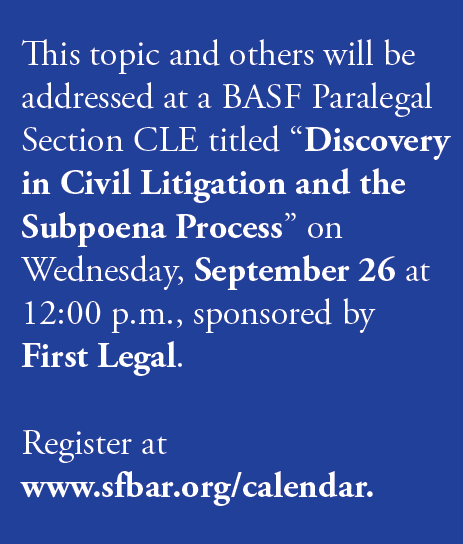 Preparing and serving out-of-state business records subpoenas can seem like a daunting task to the most experienced California paralegal. Fortunately, the Uniform Interstate Depositions and Discovery Act (UIDDA), enacted in 2007, can help demystify this task. Use the following steps to navigate the business records subpoena process in states that have adopted the UIDDA:
Preparing and serving out-of-state business records subpoenas can seem like a daunting task to the most experienced California paralegal. Fortunately, the Uniform Interstate Depositions and Discovery Act (UIDDA), enacted in 2007, can help demystify this task. Use the following steps to navigate the business records subpoena process in states that have adopted the UIDDA:
- Review the UIDDA.[1]
- Enacted by 40 states and territories (including California), the UIDDA provides a simplified procedure for parties in an action in one state to obtain records or depose parties located in another.
- This Act also lessens the need to retain local counsel, which can be cost effective for your attorney’s client.
- If the discovery state from which you seek records has not adopted the UIDDA, your attorney may need to retain local counsel to prepare and serve a subpoena.
- Determine the discovery state’s requirements for issuing a California business records subpoena.
- Review the discovery state’s pertinent rules regarding how to issue an out-of- state subpoena, paying special attention to specific processes, forms, deadlines, and fees.
- Some UIDDA states may require the home state’s court clerk to issue a commission, court order, or letters rogatory prior to issuance of the subpoena. Per California Code of Civil Procedure §2026.010(f), a commission can be obtained on request without the need to file a motion. If the discovery state court requires a court order, an order for a commission may be obtained by ex parte application.
- If necessary, contact the clerk in the discovery state’s court for further clarification on requirements.
- Prepare the discovery state’s subpoena.
- Research the discovery state’s court website for a draft subpoena caption page;
- Ensure that your draft subpoena contains the terms of the California subpoena. [2] Also, include the contact information of all counsel and any unrepresented parties (if any) in the matter. [3]
- Send the draft discovery state court subpoena with the California subpoena signed by your attorney attached to the discovery state’s court clerk, along with a transmittal letter for approval and issuance. [4]
- Issuing a records subpoena in a discovery state court does not mean your attorney’s client has made an appearance in that jurisdiction. [5] However, any discovery-related motion must be heard by the discovery state court. [6]
- Once issued, have your subpoena served by a local process server in compliance with the rules of the discovery state [7] and remember to take into account the discovery state court’s and your subpoena’s timelines and deadlines.
This topic and others will be addressed at a BASF Paralegal Section CLE titled “Discovery in Civil Litigation and the Subpoena Process” on Wednesday, September 26 at 12:00 p.m., sponsored by First Legal and presented by Martin Kayondo, Vice President of Sales at First Legal.
Register at www.sfbar.org/calendar.
About the author:
Javier Morelos is Secretary of the Paralegal Section and Senior Paralegal and Client Liaison at Hersh Family Law Practice
[1] See www.uniformlaws.org; search “UIDDA”
[2] UIDDA §3(c)(A)
[3] UIDDA §3(c)(B)
[4] UIDDA §3(a)
[5] UIDDA §3(a)
[6] UIDDA §6
[7] UIDDA §4

